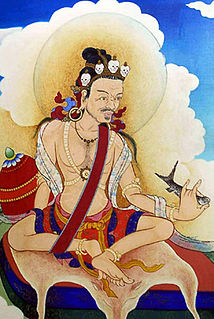A Quote by Tilopa
The appearances of the world are not the problem,
it's clinging to them that causes suffering
Related Quotes
Adventures come to the adventurous, and mysterious things fall in the way of those who, with wonder and imagination, are on the watch for them; but the majority of people go past the doors that are half ajar, thinking them closed, and fail to notice the faint stirrings of the great curtain that hangs ever in the form of appearances between them and the world of causes behind.
The world is full of suffering. Birth is suffering, decre- pitude is suffering, sickness and death are sufferings. To face a man of hatred is suffering, to be separated from a beloved one is suffering, to be vainly struggling to satisfy one's needs is suffering. In fact, life that is not free from desire and passion is always involved with suffering.
I'm absolutely convinced that this is a world of appearances, not reality. There's one reality and that's Light and Love. When some say, we create our own reality, I always demur and say, "Please, would you mind adjusting that a little bit? We create our own appearances." We become master of appearances and as we change our thought, we will see the appearances around us change. That gives us this huge sense of dominion and power and control over our world.
Do not avoid contact with suffering or close your eyes before suffering. Do not lose awareness of the existence of suffering in the life of the world. Find ways to be with those who are suffering by all means, including personal contact and visits, images, sounds. By such means, awaken yourself and others to the reality of suffering in the world.
The suffering that food animals undergo, the suffering of those who eat them and profit by them, the suffering of starving people who could be fed with the grain that feeds these animals, and the suffering we thoughtlessly impose on the ecosystem, other creatures, and future generations are all interconnected. It is this interconnectedness of suffering, and its reverse, of love, caring, and awareness, that calls out for our understanding.
Within the framework of the Buddhist Path, reflecting on suffering has tremendous importance because -realizing the nature of suffering, you will develop greater resolve to put an end to the causes of suffering and the unwholesome deeds which lead to suffering. And it will increase your enthusiasm for engaging in the wholesome actions and deeds which lead to happiness and joy.































